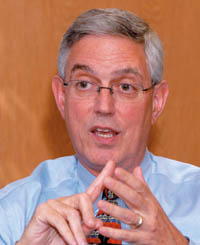
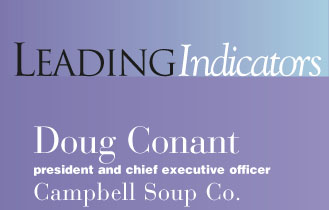
In 2001, Doug Conant joined Campbell Soup Company as president and chief executive officer, bringing 25 years of experience at General Mills, Kraft, and Nabisco. Under his leadership, Campbell has reversed a decline in market value and employee engagement. The nearly 140-year-old company, a global manufacturer and marketer of consumer food products, has a portfolio of more than 20 brands, including its flagship soups, Prego pasta sauces, and Pepperidge Farm breads and snacks. A Chicago native, Conant earned a BA from Northwestern University and an MBA from the J.L. Kellogg School of Management at Northwestern. On December 20, 2007, Campbell announced the sale of its Godiva Chocolatier unit to Yildiz Holding AS, of Turkey, for $850 million, nearly 15 times EBITDA.
Doug Conant was interviewed by Adrienne Carter, deputy editor in the finance department at BusinessWeek, where she covers the food and finance industries.
|
Adrienne Carter: You joined Campbell at a point of weakness, far different from where it is today. What was your initial assessment?
Doug Conant: When I arrived, the company had the worst performance profile in the food industry. We were still marketing the same condensed soup that we had been marketing for 70 years, and, arguably, with the same people. The company had great brands, such as Campbell's and Pepperidge Farm, and good categories that had the potential to be expandable. It had a great financial profile, great margins, and good cash flow. We just had no growth. Our first goal was to get the organization to a point where it was competitive on a good day, because we were uncompetitive in everything.
AC: How do you go about changing a culture that's arrived at that point?
DC: The situation had been deteriorating for a long time. I believe you can't talk your way out of something you behaved your way into. We became very explicit about expectations and accountability, and institutionalized that in the “Campbell leadership model.” Over a three-year period, we evaluated the leaders against that model. If they met the standards, they stayed; if not, they left. In culture building, you have to be tough on standards, but tender with people. Of our top 350 leaders, we turned over 300 in the first three years. Of those, 150 were promoted from within.
AC: You spent a lot of time making sure your work force was interested and engaged. How do you measure something like that?
DC: Employee engagement is the strongest proposition I've found when it comes to culture building. With help from the Gallup Organization, we measure each of our 525 work groups via a short list of questions, and then compare the results to other companies' results. We also look at our employee engagement ratio. To reach world-class levels of productivity, you need 12 engaged people for every one actively disengaged. Our scores on both counts have gone way up.
“Very few people are fired because they can't do an ROI analysis or use the tools you learn here at NYU Stern. Where people inevitably run into trouble is their ability to manage expectations and relationships and effectively communicate.” |
AC: You've been very successful in innovation, relative to your peers. How did you accomplish this?
DC: If you have people who are engaged, they give you the answers. Based on our sales force's observations, we did a time study and found that consumers don't want to spend more than 20 seconds looking for a particular soup. But finding ours took 70 seconds. So we developed a shelving system that makes it easier both to stock our products and to find them. R&D upgraded product quality. Our IT people spearheaded an enterprise-wide planning system. The international division suggested we should be in Russia and China. We also innovated in key trend areas such as wellness, convenience, and quality. With the marketing department's input, we started introducing microwaveable, healthier soups in 2003. It's now a $300 million business and makes us more relevant to a different generation of consumers.
AC: Strategically, you're now moving away from the “indulgence” area with the sale of your Godiva unit. How do you reassess an innovation strategy as time progresses?
DC: The more focused we can be, the better. We've decided to home in on three things: simple meals, where we're anchored in soup; baked snacks, where we have biscuits, Pepperidge Farm, and others; and healthy beverages, with V-8 tomato juice. Assessing our fourth category, Godiva, I thought our resources could be better deployed against the other three.
AC: China and Russia consume billions of bowls of soup each year. How do you adapt what you do and bring that to consumers who have a different eating pattern?
DC: China and Russia are the two largest soup consumption markets in the world, and the soup is all homemade. For our company, going there is the equivalent of JFK talking about sending the first man to the moon – it puts a spring in everybody's step. China and Russia are unique cultures, where soup, unlike soda or cookies, is sacred ground. We had to find a way to leverage our expertise in a way that respected that. In both countries, homemakers make soup twice a week by first making a basic broth. We've crafted an entry plan where we can introduce a consistent, higher-quality broth that saves them two to six hours.
AC: How did you research it? Did you put people into homes?
DC: We had people living in the homes of families in both countries. China is a large, complex grid with different populations. We had special ethnography sessions to help us understand the deeper cultural values associated with soup.
AC: Campbell's stock is up, and so are sales. What's the challenge now?
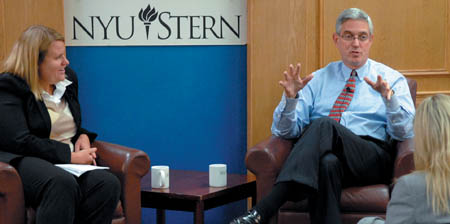
Adrienne Carter interviews Doug Conant at a CEO Series event held at NYU Stern in October. |
DC: Our goal is to be the world's most extraordinary food company. We have a 10-year plan that we divide into stages. The first three years we went from being uncompetitive to being competitive on a good day. Next, we established that we would aim for quality growth and to be above average every day. That's where we are today. By 2011, we want to be delivering the best total shareowner returns in the food group, to be what we call a “sustainably good company.” We want to do this in a way that we can envision repeating year after year.
AC: What advice would you give your competitors, who seem to be going through a lot of what you went through five years ago, struggling to innovate and turn around their sluggish sales?
DC: Stick to your knitting, and do what you do well. Also, it's all about your people and how you get them engaged. All other competitive advantages ultimately prove to be illusory. You may have a technology edge today, but somebody else will have the same thing tomorrow. The real competitive advantage is your workforce and its ability to be agile and deal with dynamic markets and situations.
AC: Why is it so important to study leadership instead of just experiencing it?
DC: The saying that leaders are born, not made, is a bunch of hooey. If you want to be really good at something, you have to study it and work at it. If you're going to invest in your education and aspire to be a leader in industry, I think you have to treat it as your craft, not as your job, and you have to learn and absorb all you can. This will differentiate you. You have to prepare yourself to lead.
AC: You describe yourself as an introvert, which does not seem like the right personality for a CEO. How do you make that work for you?
DC: In my opinion, more than half of all CEOs are introverts. They're internally driven, and they have a paradigm that they're anchored to so they can deal with rough seas. The most effective CEOs are not the ones trying to please everybody. They're driving the agenda. You have to communicate with people, but you also have to give yourself time to regroup and go do the same thing the next day.
AC: Early in your career, you got fired. How did you overcome an obstacle like that?
DC: After 10 years with General Mills, I was working in a subsidiary that was spun off, and my job was eliminated. I went home to my wife, my two small children, my cats, my dog, and my one very large mortgage not knowing what to do and totally unprepared. It was probably the most challenging time in my professional career. I was out of work for a year, and for an introvert to have to go out and interview for jobs is scary. And I had mouths to feed. Twenty-two years later, I can say it was a blessing because I realized I needed to own my own development, to become a student of my craft, and to be engaged in the work in a bigger way. It also sensitized me. Once you've been through that, you can't help but want to give back and help others. I learned a lot. But once was enough.
AC: What advice do you offer to MBA students starting out?
DC: There are 10 two-letter words that are critical for anyone's career: "If it is to be, it is up to me." Also, the soft stuff is the hard stuff. Very few people are fired because they can't do an ROI analysis or use the tools you learn here at NYU Stern. Where people inevitably run into trouble is their ability to manage expectations and relationships and effectively communicate.
Audience Questions
Q: You took a group of people who weren't performing. What did you do to convince them that you were somebody that they could make a commitment to, and that you were going to be able to do what needed to be done?
DC: The first hour of the first day that somebody works for me, I take him through “here's who I am, and here's what I believe.” You declare yourself. Then, you act with integrity and do what you say you're going to do. We made what became known as the “Campbell Promise:” We're going to demonstrate we value you, and then, over time, we're going to trust that you will value our agenda because you believe in us. Then you give people time to make their own judgments.
Q: You mentioned that when you joined Campbell, you wanted to bring in people who wanted to be part of a transition. Today, what would you tell someone applying to Campbell?
DC: We screen on three key characteristics: people with character and competence who can thrive in a team-based environment. We also have a leadership model, with expectations of such qualities as a demonstrable ability to inspire trust, motivate people, and execute against a plan.
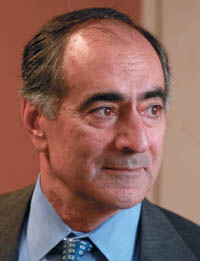

John Mack is chairman and chief executive officer of Morgan Stanley, a global financial services company with approximately $782 billion in assets under management, as of November 30, 2007. He previously spent nearly 30 years at the firm in various positions. Prior to his current role, Mack served as chairman of Pequot Capital Management, and before that, as co-CEO of Credit Suisse Group and CEO of Credit Suisse First Boston. Mack is a graduate of Duke University, where he is a member of the Board of Trustees. With more than 600 offices in 33 countries, Morgan Stanley serves clients worldwide, providing a range of investment banking, securities, investment management, and wealth management services.
John Mack was interviewed on October 1, 2007, by Maria Bartiromo, an NYU alumna and member of NYU's board of trustees. Bartiromo is the anchor of CNBC's "Closing Bell” and the host and managing editor of the nationally syndicated "Wall Street Journal Report.” She writes a biweekly column for BusinessWeek and a monthly column in Reader's Digest.
|
Maria Bartiromo: Today the Dow Jones Industrial Average hit an all-time record high, up nearly 200 points, just about a month and a half after we had so much volatility and worry about the weakness in the subprime housing market. How would you characterize the environment right now?
John Mack: I think we will have some real issues in the next 12 months, given what happened in the subprime market. On the plus side, US corporations are sitting on a lot of cash on their balance sheet, unemployment is relatively low, and the dollar is weak, which is great for manufacturing and exports. I believe the rest of the world has decoupled from the US – the global economy is still growing really well. If the US goes into a recession, there's no question it will have impact, but the fundamental change that has taken place in the global economy is permanent. People are very bullish long-term on the economy. But in the short run, six to 12 months, I still think we're on dangerous ground.
MB: If the rest of the world is growing, what does that mean to those of us living and working in the US?
“I think the US has to become much more proactive in global politics. It is imperative that we keep feeding this country with bright and talented people from around the world. Our politicians have to understand that it's a global economy, and that we cannot give in to isolationism.” |
JM: First, if I were just graduating from NYU Stern, I would be going overseas to China, India, Turkey, Russia, Brazil. I think the opportunities of not only being involved in an emerging economy, but to grow and to create real, intrinsic value in yourself, increase dramatically. Number two, I think the US clearly has to figure out a way to be much more fiscally responsible. We cannot have the situation we have now, with over $1 trillion debt being held by one country. Sooner or later, there's got to be a way that we can get some of that money back into this country. So what it means to us, and I think you'll see this clearly in the next election, is that we have to be far more disciplined in creating our savings and balancing our budget. I think the next 10 to 15 years are going to be much more difficult for the US and how it interfaces with the rest of the world.
MB: We hear so much talk about the US losing its competitiveness, deals going to London and Shanghai and not the New York Stock Exchange and NASDAQ. Are you worried about that?
JM: With markets around the world being open, and with liquidity being able to move around the world, New York, I believe, has a real issue just on financial service. But what bothers me the most is that our politicians have become very US-centric. There is a tremendous movement toward xenophobia. I think the US has to become much more proactive in global politics. It is imperative that we keep feeding this country with bright and talented people from around the world. Our politicians have to understand that it's a global economy, and that we cannot give in to isolationism.
MB: To what do you attribute your success?
JM: I think a lot of it is luck. But I work hard; I think I have the right values. I grew up in a family where you had to work, and I went to school on a scholarship. I have the ability to read people pretty well. I'm intuitive. If you get too much information, too much data, it locks you in. I believe you need information, but at some point you have to make a decision.
MB: What does it take to be successful in this competitive world?
JM: You need to take risks and tell people what you think. You do not want to work for a firm that doesn't want your opinion. Now, you need to learn how and when to do that. From the management side, you have to nurture an environment where employees can deliver a constructive message and not get shot – for instance, at town hall meetings, which we have at Morgan Stanley.
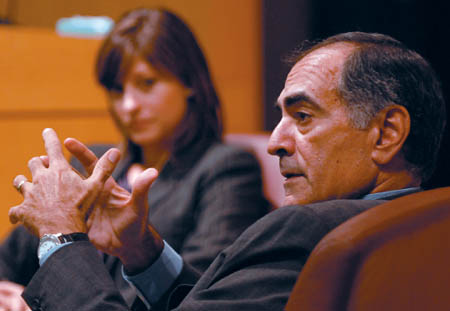
John Mack is interviewed by Maria Bartiromo at a
CEO Series event held at NYU Stern on October 1, 2007. |
MB: We're watching a lot of financial services companies cut jobs. What do you say to those who want to work in the industry?
JM: I think you're going to see a restructuring of jobs in the mortgage area in the US. People either need to go overseas and start taking different jobs, or taking different jobs here. Our job openings today at Morgan Stanley are in our international areas. In Asia, we're understaffed, and we're hiring as many qualified people as we possibly can get. In the US, job-seekers in the financial sector are going to have it tougher. You just have to knock on doors, be flexible, and be willing to take a job overseas.
MB: What do you think is the most important second language, aside from English, that we all should learn?
JM: Either Chinese or Spanish.
MB: Everybody's talking about “going green.” Is this a public relations stunt on the part of corporations or do they want to protect the environment and do it in an efficient way?
JM: I think shareholders are going to demand green programs, so corporations have no choice. If Morgan Stanley and other firms were not serious about implementing green programs, we would not attract a lot of the young talent that come to our firm.
MB: What's going to be the next big thing?
JM: I think it's going to be in the environmental area – the opportunities to develop the whole green movement, the industries that will come out of that, and the technology that will be developed for it.
Audience Questions
Q: How do you look at the African market, especially countries that have discovered oil?
JM: We have an office in South Africa, and we're trying to figure out how to move north into Nigeria and other resource-rich countries. It is still very difficult to do. We have done some transactions in Nigeria. I've been irritated that our African effort has never gotten a lot of support from the firm as a whole. The real opportunity for us is to use South Africa as the base to cover sub-Saharan Africa, and that's what we'll do. As for the north, even though there's a big connection with the French in Algiers and Morocco, most likely we're going to cover that out of Dubai.
Q: I'm wondering why you support Senator Clinton for 2008?
JM: If you go back a couple of elections, I was a Ranger or a Cowboy for President Bush. I didn't particularly like the Senator. But a few years ago while I was at Credit Suisse, I hosted a panel and reception for her. There was no question you could ask her that she couldn't answer with knowledge. Since I've been back at Morgan Stanley, she's our New York senator, and she's represented financial service in an outstanding way. She gets it, and she fights not just for the City but for New York. If you see her in action in Washington, you see that she understands how to work both sides of the aisle. One of my big concerns is the global world we live in, and she understands global issues. The only way to create solutions is through dialogue. I believe she will do that. That's why I'm supporting her.
Q: How do you view your time at Credit Suisse? What lessons did you take away from that personally and professionally?
JM: I think
that the biggest difference is that the culture was very diverse
at Credit Suisse; whereas, at Morgan Stanley, even though I
think they got off track for a while, it still was a unified
culture. The biggest lesson I've taken away is that gut feeling,
or intuition, is a powerful tool in managing and in making
decisions. When I meet with my management committee at Morgan
Stanley, they hear from time to time, "Look, I understand
your arguments, but my gut tells me we're going to do it this
way." And I do it.
Q: When you talk about the growing economies in India, China, and Brazil, what areas of opportunity do you suggest that we tap into once we graduate?
JM: You should try to get a job in a diversified financial service business where there are so many different disciplines you can get into to create a career. I would go to China and try to be in investment banking. I think skilled labor is in demand around the world, so I think virtually everything from the service industry to the construction industry presents opportunity.
Q: In the next 10 to 15 years, do you think Morgan Stanley's going to be a US company with international operations, or do you think it's going to be a global company where it might have its headquarters outside the US? And is there any chance of an acquisition?
JM: I think it will be a global company. With what's going on overseas and the speed that it's going on, you want to be on the ground and be there. And if I could find the right acquisition internationally, I would do it.


![]()